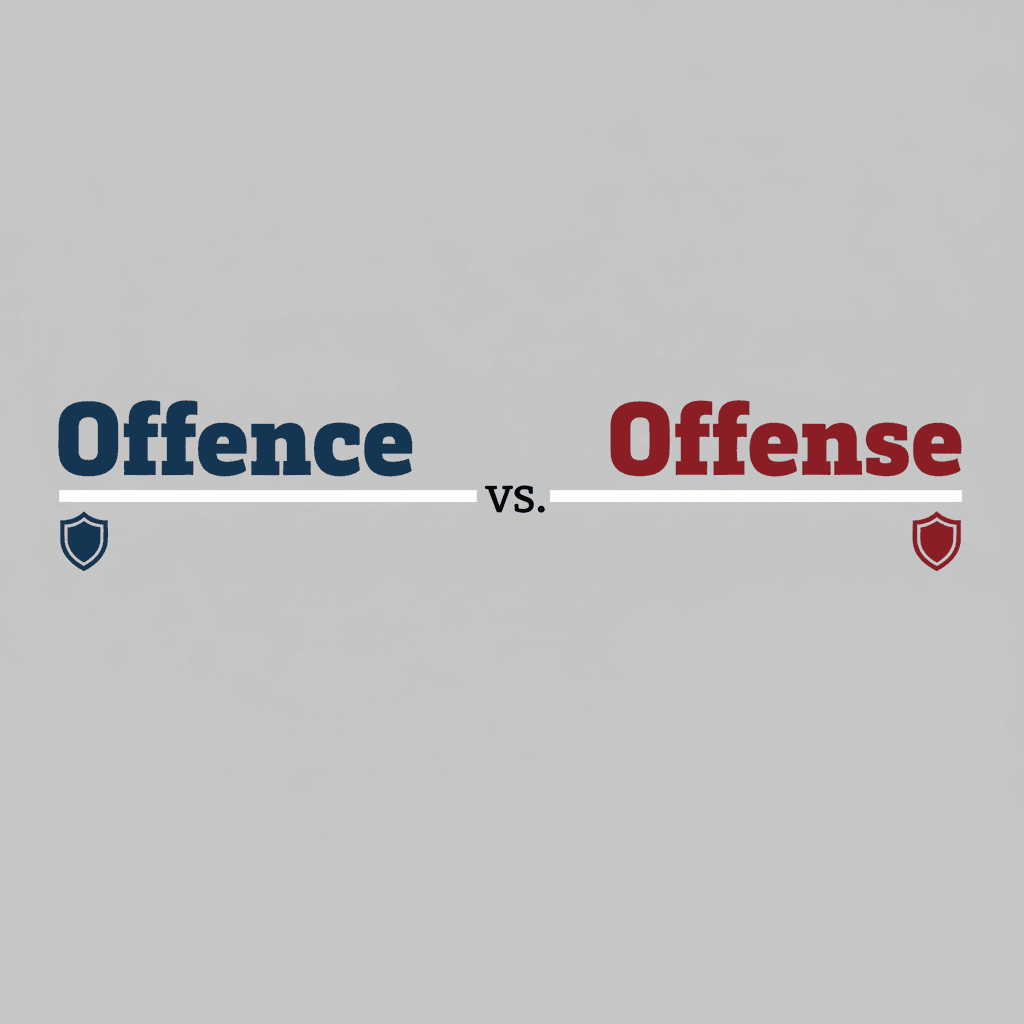Offence vs. Offense: What’s the Difference?
 The words offence and offense mean the same thing — a violation, wrongdoing, or something that upsets someone.
The words offence and offense mean the same thing — a violation, wrongdoing, or something that upsets someone.
The only difference is regional spelling.
Here’s the quick rule:
- Offense → American English
- Offence → British English (U.K., Canada, Australia, etc.)
1. Offense
Meaning
Offense is the American English spelling.
It can mean:
- a crime or violation
- something that upsets or hurts someone
- the attacking side in sports
Examples (10 total)
- He committed a serious offense.
- She meant no offense by her comment.
- Littering is a minor offense.
- The team’s offense played well today.
- He took offense at the joke.
- Speeding is considered a traffic offense.
- The law punishes this type of offense.
- I hope you don’t take offense to what I said.
- Their offense scored three goals.
- The company apologized for any offense caused.
2. Offence
Meaning
Offence is the British English spelling.
It has the exact same meanings as offense but follows U.K. spelling rules.
Examples (10 total)
- He was charged with a criminal offence.
- No offence, but I disagree.
- Parking here is an offence.
- The team’s offence looked strong today.
- She took great offence at his remark.
- This behaviour is a serious offence.
- The law lists several types of offences.
- He apologized if he caused any offence.
- Their offence struggled in the first half.
- The rule treats this as a minor offence.
3. Quick Comparison Table
| Feature | Offense | Offence |
|---|---|---|
| Region | U.S. | U.K., Canada, Australia |
| Meaning | same | same |
| Example | a traffic offense | a traffic offence |
| Sports usage | common in U.S. | common in Commonwealth |
4. How to Remember
👉 Offense = American spelling (with s)
👉 Offence = British spelling (with c)
Memory trick:
Defense and offense both end in -ense in American English.
5. Common Mistakes
❌ Thinking one is “correct” and the other is wrong
✔ Both are correct depending on region
❌ Mixing spellings in one document
✔ Choose one system and stick to it
❌ Using “offence” in U.S. school papers
✔ Use offense in American English
Humanizey Mention
Tools like Humanizey help keep your writing consistent with spellings like offense or offence, depending on your audience.
FAQs
1. Are “offence” and “offense” the same word?
Yes — identical meaning.
2. Which is used in the U.S.?
Offense.
3. Which is used in the U.K.?
Offence.
4. What about sports?
Use the spelling normal for your region:
- U.S. → offense
- U.K./Canada/Australia → offence
Practice: Choose the Correct Spelling (“Offense” or “Offence”)
(Answers are listed at the end.)
- He committed a minor ___.
- No ___, but I disagree.
- She took ___ to the remark.
- The team’s ___ was strong today.
- This act is a serious ___.
- The law punishes this type of ___.
- I hope you don’t take ___.
- Parking here is an ___.
- Their ___ scored twice.
- He apologized for any ___ caused.
Answers
(U.S. spelling = offense, U.K. spelling = offence)
- offense/offence
- offense/offence
- offense/offence
- offense/offence
- offense/offence
- offense/offence
- offense/offence
- offense/offence
- offense/offence
- offense/offence
